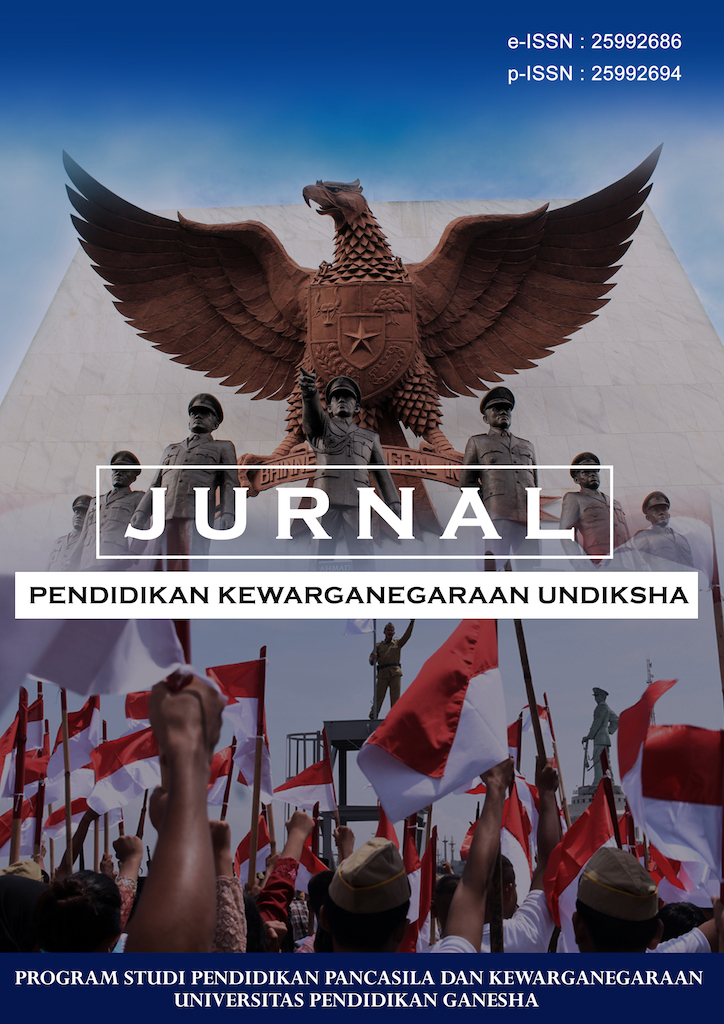FLEKSIBILITAS TRADISI PESANTREN TERHADAP KEKERASAN PADA ISTERI (STUDI KASUS PADA PENERAPAN UU PKDRT DI LINGKUNGAN PESANTREN KAB. JOMBANG)
DOI:
https://doi.org/10.23887/jpku.v9i1.31441Abstract
The pesantren community has actually been aware of the issue of domestic violence (KDRT) for a long time, but that does not mean they really understand the meaning of domestic violence as a whole. Because in reality, domestic violence itself is hidden in the world of pesantren households. Other things
that may also be the cause of the occurrence of domestic violence in the pesantren are the kyai's patrons as leaders of the pesantren who cannot be shaken by anything. Many facts also support that the words of the kyai are always true and never wrong, because he is considered the most understanding of religious teachings. Apart from that, the existence of a verse which states about the nusyus of a wife, and the family study which says "may hit" is taken literally.
The special condition of the traditions in the pesantren and the controversy between the traditions in the pesantren and the PKDRT Law makes this interesting to be investigated further.
The purpose of this research is to find out: Does the pesantren tradition trigger domestic violence and how to overcome domestic violence in pesantren?
The approach used in this research is the socio legal research approach, namely through this approach the law is also conceptualized as an empirical social phenomenon, namely in the daily actions and interactions of citizens, not only as laws or judges' decisions.
The results of this study indicate that the pesantren tradition does not trigger domestic violence even though it is possible that there is gender imbalance in husband and wife relationships, but traditions in pesantren provide more learning that supports emancipation and gender equality without leaving religious norms. Whereas alternative solutions for handling domestic violence in pesantren were not held because there were no incidents that referred to domestic violence, but to prevent domestic violence, pesantren also contributed roles through the educational approach for santri, namely education on fair husband and wife relationships and acknowledging equality but still within the frame. the teachings of the Islamic religion, according to each other's nature by still helping each other in all parts of the household.
Keywords: Islamic boarding school tradition, domestic violence
References
Eti Nurhayati, “Domestic Violence”, Jurnal, EQUALITA STAIN Cirebon, Vol. 3 No. 2 Juni, 2013
KH. Mohammad Tidjani Djauhari, MA, Masa Depan Pendidikan Pesantren Agenda yang Belum
Terselesaikan, Jakarta: Taj Publishing, 2013
Afwah Mumtazah, KDRT dalam persepsi Ibu Nyai Pesantren, Studi Kasus Pesantren-pesantren
Cirebon, Jurnal Islam-Indonesia: Volume 02, Nomor 01, Tahun 2010/1432)
Moerti Hadiati Soeroso S.H., M.H., Kekerasan Dalam Rumah Tangga Dalam Perspektif Juridis
– Viktimologis, Sinar Grafika, Jakarta, Cetakan III, 2012
----------------, Jurnal Perempuan, “Pekerja Rumah Tangga”, Jakarta: Yayasan Jurnal Perempuan, 2011
Soedandyo Wignyosoebroto, Hukum: Paradigma,Metode dan masalahnya, ELSAM dan HUMA,
jakarta, cet. I, 2012
Burhan Ashshofa, 2014, Metode Penelitian Hukum, PT Rineka Cipta, Jakarta
Bambang Waluyo. 2012. cetakan ketiga. Penelitian Hukum Dalam Praktek, Sinar Grafika. Jakarta
Mastuhu, Dinamika Sistem Pendidikan Pesantren , Jakarta, INIS 2014
HM Arifin, Kapita Selekta Pendidikan, Jakarta, Bumi Aksara, 2011
Abdullah Syukri Zarkasyi, “Langkah Pengembangan Pesantren” dalam Rekonstruksi Pendidikan
dan Tradisi Pesantren; Religiusitas Iptek, Yogyakarta, Fakultas Tarbiyah IAIN Sunan Kalijaga dan Pustaka Pelajar, 2012
Zamakhsyari Dhofier, Tradisi Pesantren; Studi Pandangan Hidup Kiai dan Visinya Mengenai Masa Depan Indonesia ,Jakarta: LP3ES, 2011
Nurcholish Madjid, Bilik-Bilik Pesantren: Sebuah Potret Perjalanan, Jakarta: Paramadina, 1997 M. Athiyyah al-Abrasyi, Dasar-dasar Pokok Pendidikan Islam, terj. H. Bustami A. Gani dan
Djohar Bahri Jakarta: Bulan Bintang, 1987
Ali Yafie, Menggagas Fiqh Sosial: Dari Soal Lingkungan Hidup, Asuransi hingga Ukhuwah ,
Bandung: Mizan, 1994
Downloads
Published
Issue
Section
License
Authors who publish with the Jurnal Pendidikan Kewarganegaraan Undiksha agree to the following terms:
- Authors retain copyright and grant the journal the right of first publication with the work simultaneously licensed under a Creative Commons Attribution License (CC BY-SA 4.0) that allows others to share the work with an acknowledgment of the work's authorship and initial publication in this journal.
- Authors are able to enter into separate, additional contractual arrangements for the non-exclusive distribution of the journal's published version of the work (e.g., post it to an institutional repository or publish it in a book), with an acknowledgment of its initial publication in this journal.
- Authors are permitted and encouraged to post their work online (e.g., in institutional repositories or on their website) prior to and during the submission process, as it can lead to productive exchanges, as well as earlier and greater citation of published work. (See The Effect of Open Access)










